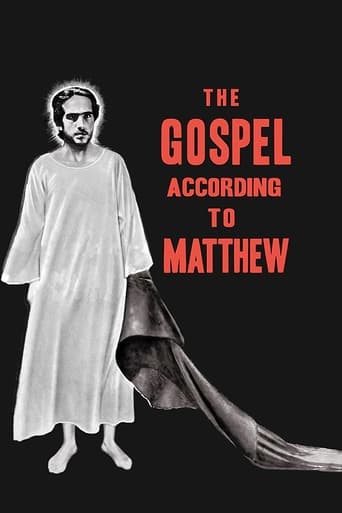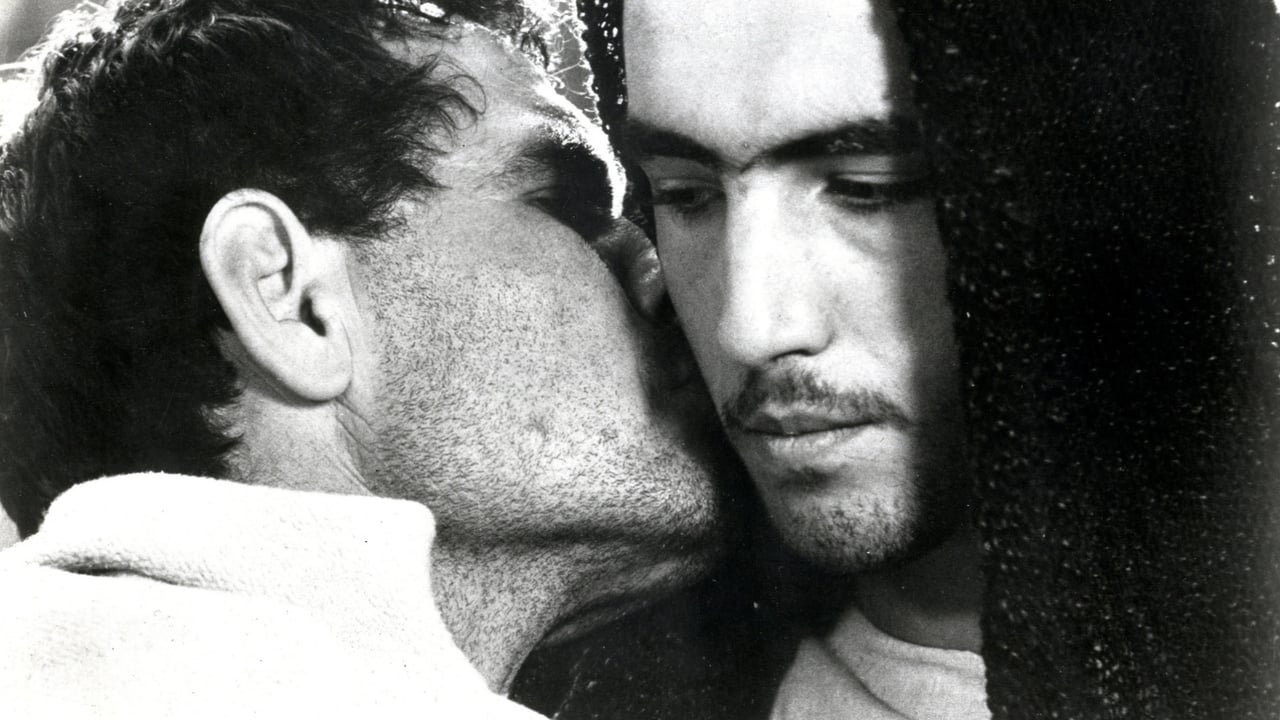gavin6942
Along a rocky, barren coastline, Jesus begins teaching, primarily using parables. He attracts disciples; he's stern, brusque, and demanding. He comes to bring a sword, not peace, he says. He's in a hurry, moving from place to place near the Sea of Galilee, sometimes attracting a multitude, sometimes being driven away.The director reportedly chose Matthew's Gospel over the others because he had decided that "John was too mystical, Mark too vulgar, and Luke too sentimental." An interesting analysis, and more interesting that he picked just one rather than combine them as people tend to do. Given Pasolini's well-known reputation as an atheist, a homosexual, and a Marxist, the reverential nature of his film could come as a surprise at a first approach.The film received mostly good reviews from critics, including several Christian critics. Philip French called it "a noble film," and Alexander Walker said that "it grips the historical and psychological imagination like no other religious film I have seen. And for all its apparent simplicity, it is visually rich and contains strange, disturbing hints and undertones about Christ and his mission." The Vatican allegedly said it was the best version of Jesus' life on film. How strange that a homosexual, atheist revolutionary could tell the story so well... or perhaps it is not strange at all?
Jackson Booth-Millard
I found this Italian film in the book 1001 Movies You Must See Before You Die, I read more about and saw its positive reviews, it definitely sounded worth the effort, directed by Pier Paolo Pasolini (Salò, or the 120 Days of Sodom). Basically this film is as the title says, it is about the life of Jesus Christ of Nazareth, according to the gospel of Saint Matthew (Ferruccio Nuzzo). The film starts with the story of young Mary (Margherita Caruso) and Joseph (Marcello Morante) seeking shelter for her to give birth, they find a stable, baby Jesus is born, and they escape a threat from King Herod I (Amerigo Bevilacqua). Years later Jesus Christ (Enrique Irazoqui) works as a carpenter, he gains followers, disciples, from performing his miracles to feed the hungry and heal the weak, and praising and preaching to people about the love of God. But Jesus, the son of God and the prophesied messiah, is also feared by people in the Roman kingdom, particularly coming to the attention of the Pharisees, the chief priests, and elders. Following the "Last Supper" and the betrayal by Judas (Otello Sestili), Jesus is arrested by the Romans, tried and sentenced to be crucified, he dies on the cross, but three days later he rises from the dead to give a final message to the believers before disappearing to go to Heaven. Also starring Susanna Pasolini as older Mary, Mario Socrate as John the Baptist, Settimio Di Porto as Peter, Giacomo Morante as John, Alfonso Gatto as Andrew, Luigi Barbini as James, Giorgio Agamben as Philip, Guido Cerretani as Bartholomew, Rosario Migale as Thomas, Marcello Galdini as James son of Alphus, Elio Spaziani as Thaddeus, Enzo Siciliano as Simon, Juan Rodolfo Wilcock as Caiphus, Alessandro Clerici as Pontius Pilate, Francesco Leonetti as Herod II, Franca Cupane as Herodiade and Paola Tedesco as Salome. Enrique Irazoqui gives a great gentle performance, I know the story of Jesus from various other film versions, this one needs no Hollywood bang to it, with its perfect classical music and simplistic story telling, the biggest moments are the smallest, e.g. a disfigured man healed in seconds, this is a good old fashioned very religious biblical drama. It was nominated the Oscar for Best Art Direction-Set Decoration, Best Costume Design and Best Music for Luis Bacalov, and it was nominated the BAFTA for the UN Award. Very good!
dianewds-638-498121
Nearly 50 years later, this film still delivers in a big way! The characters translate both the spoken and unspoken Word; spirit is captured. Though many very slow and long shots, I found them purposeful and more of an addition than subtraction to the overall. The sets were realistic and the actors for Jesus, Mary and the Apostles were all believable. Even 47 years ago, the make up for lepers was really good. The technical for Jesus walking on the water was believable. Loved the scenes with Satan in the dessert and the sound and details with camera focused on the dust coming from his walk. Cannot think of a better modern day rendition of the NT.
Dr Jacques COULARDEAU
An extremely famous film about an extraordinarily famous Gospel, that of Saint Matthew, yet I am wondering what makes it different from so many other versions of that story. Even the music is not original. So what is? It is purely artistic, will I say, but what do I mean exactly? First Pasolini decided to shoot his film in black and white, or if you prefer all in gray. I would say that projects us into the past at once. We are in an old story we all know by heart or nearly and since it comes from so far away it does not need any colors. We are color-blind when remembering the distant past.Second the story is condensed essentially to the words of Jesus and the voice over of a narrator, or nearly just to that. Any other voice is particularly strong then, for example Peter denying his knowing Jesus three times. We don't need the cock after that.This story telling technique is to make us jump from one episode to another with absolutely no link in-between. Ellipse upon ellipse, our knowledge of the story links up the pieces of the tale. The vision then can be hyper simplified. No special costumes, no special sets, no special effects either. Just plain, simple, even brutal facts, nearly too brutal to actually be moving. It becomes cold after a while.Then the camera is used in the strangest way possible: slow long movements over vast distant landscapes alternate with close-up shots of faces or small numbers of characters. Very few scenes of action, violence or movement. We are nearly confronted to a still life that is so static that we are like turning the pages of a picture book or a book of engravings telling us the story.In those nearly immobile pictures Pasolini adds speech, and nothing else but speech, no dialogue, just Jesus in a way reciting his own gospel and a narrator linking up the bits and pieces. In such a still, slow, nearly stagnant succession of scenes that makes you jump over from one to the next as if it were a slide show you feel no emotion, no passion, just a message that is transmitted to you with as little interference as possible.Some say it is a masterpiece. It might have been but today it looks slightly sallowish if not faded. It remains an impressive message but it misses the human dimension, even if Jesus is the Son of Man and in a way not human. Pasolini has invented with this film a Franciscan cinematographic Passion, but there is a lot more about Jesus than this grayish panegyric of poverty and the poor.Dr Jacques COULARDEAU, University Paris 1 Pantheon Sorbonne, University Paris 8 Saint Denis, University Paris 12 Créteil, CEGID


 AD
AD


